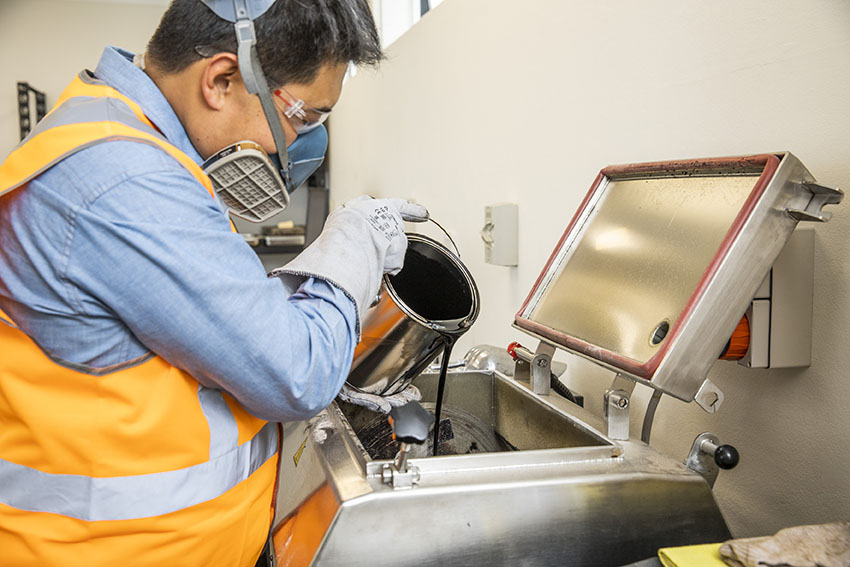What is Asphalt?
Asphalt is the go-to material for those looking to build highly durable and long-lasting road infrastructure. And as sustainable road construction becomes more of a priority, asphalt’s popularity is growing. But what is asphalt, and why is it so widely used?
Here we’ll break down how this material is made, what it’s composed of, and how it compares to other materials like concrete.
What is Asphalt?: A Comprehensive Guide

Asphalt is a composite material made up of aggregates, binders, and fillers. It’s primarily used to construct and maintain roads, highways, and pavements.
It’s also used in projects like airport runways, parking lots, and even recreational areas like playgrounds and sports courts. The most common application is for road construction, where its durability and cost-effectiveness make it a go-to choice for large-scale construction projects.
What is Asphalt Made Of?
Here are Asphalt’s key components:
- Aggregates: These are typically crushed stone, gravel, or sand, forming the bulk of the asphalt mixture. Some modern asphalt mixes also include recycled materials like construction debris, making the product a more sustainable and eco-friendly alternative.
- Binders: Bitumen, a by-product of petroleum refining, is the most commonly used binder in asphalt. It holds the aggregates together and provides the material with its flexible yet durable nature.
Lately, there’s been a push toward using bio-based binders and recycled materials, further enhancing the sustainability of asphalt production.
How is Asphalt Made?

The production process starts at an asphalt plant, where the ingredients are mixed and heated. The temperature and method of production can vary depending on the type of asphalt being produced. So, how is asphalt made exactly? Here’s the breakdown:
- Hot Mix Asphalt (HMA): This is the traditional method where asphalt is mixed at temperatures between 150-180°C. It’s the most commonly used type for road construction.
- Warm Mix Asphalt (WMA): Produced at temperatures 20-40°C lower than HMA, WMA requires less energy and reduces emissions during production. This makes it a more sustainable choice for road projects.
- Cold Mix Asphalt (CMA): No heating is involved in the production of cold mix asphalt. It’s primarily used for patching or smaller-scale projects.
Each of these methods has unique benefits depending on the application. Warm and cold mixes are becoming popular for their reduced environmental impact, which contributes to sustainable infrastructure initiatives.
Is Asphalt Cheaper Than Concrete?
Shopping for material for your next construction project? If you’re looking at a large-scale venture, you might want to consider opting for asphalt; it’s typically more quicker and more cost-effective in the long term when compared to concrete. Here’s why it’ll fare better than concrete:
- Less downtime : If you don’t have time for your project to drag on (and let’s be honest, who does?) then asphalt is a more practical choice. Unlike concrete, asphalt is quick to install with very little downtime, ensuring your roads will be operational much sooner.
- Maintenance and Repairs: Asphalt may require more frequent maintenance than concrete, but it’s easier and more affordable to repair. Potholes and cracks in asphalt can be quickly repaired, whereas concrete repairs are often more labour-intensive and costly.
- Lifespan: While concrete tends to have a longer lifespan, asphalt’s flexibility makes it better suited for regions with temperature fluctuations, as it is less likely to crack from expansion and contraction.
Types of Asphalt and Their Uses
There’s no one-size-fits-all when it comes to asphalt. Various types are used depending on the project’s needs and environmental conditions. Here are some of the most common types:
- Dense Grade Asphalt (DG) / Asphalt Concrete (AC): This is the most widely used and most versatile type of concrete, suitable for most road construction and general paving.
- Stone Mastic Asphalt (SMA): A high performance asphalt known for its strength, SMA is used in high-traffic areas like highways to reduce surface water, water spray and noise pollution.
- OPen Grade Asphalt (OGA): A pavement best suited for free flowing traffic applications, it has superior water drainage properties and can greatly improve driver visibility during wet weather.
Each type offers unique benefits in terms of durability, flexibility, and suitability for specific conditions, from heavy vehicle traffic to extreme weather.
The Future of Asphalt: Sustainable Road Construction
As a construction material, asphalt has evolved significantly over the years to meet the changing and more sustainable needs of the market. From using recycled materials in its production to developing energy-efficient manufacturing processes, asphalt plays a pivotal role in sustainable infrastructure development.
- Recycling: Modern asphalt plants can incorporate up to 100% recycled materials, reducing waste and conserving natural resources.
- Lower Emissions: Warm Mix Asphalt (WMA) production methods significantly reduce the energy required and emissions produced, making it a greener choice.
- Durability: Sustainable asphalt mixes are designed to last longer, reducing the frequency of repairs and the overall environmental impact of road maintenance.
With these advancements, asphalt contractors are increasingly offering more sustainable options for asphalt paving, making it easier for both private and public sector projects to meet environmental goals.
Asphalt’s Essential Role in Infrastructure
From its flexibility to its cost-effectiveness, asphalt continues to be an indispensable material in infrastructure projects across the planet. Whether you’re building roads, parking lots, or runways, asphalt offers a versatile, sustainable solution that can withstand the demands of modern transportation and construction needs. For more information or to explore our range of asphalt services, reach out to experienced asphalt contractors today.